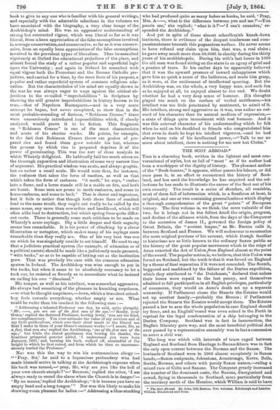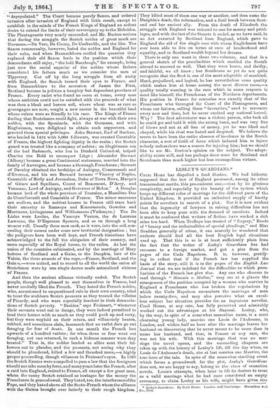THE SCOT ABROAD.*
THIS is a charming book, written in the lightest and most con- versational of styles, but as full of " meat " as if its author had been a worshipper of the dignity of history. The pleasant author of the "Book-hunter," it appears, either passes his leisure, or did once pass it, in an effort to reconstruct the history of Scot- land, and has used the knowledge he has acquired and the col- lections he has made to illustrate the career of the Scot out of his own country. The result is a series of sketches, all readable, most of them full of information which, to a Southron at least, is original, and one or two containing generalizations which display a thorough comprehension of the great " points " of European history. The first volume is, we think, the more valuable of the two, for it brings out in the fullest detail the origin, progress, and decline of the alliance which, from the days of the Conqueror to the accession of James II., governed the foreign policy of Great Britain, the "ancient league," as Mr. Burton calls it, between Scotland and France. We will endeavour to summarize the more original portions of his account, which though familiar to historians are as little known to the ordinary Saxon public as the history of the great popular movement which in the reign of Anne extorted the Act of Union from England almost at the point of the sword. The popular notion is, we believe, that this Union was forced on Scotland, but the truth is that it was forced on England by a threat of final separation if it were not conceded. The Scotch, beggared and maddened by the failure of the Darien expedition, which they attributed to "the Dutchman," declared that unless their lessee were repaid to the last penny, and themselves admitted to full participation in all English privileges, particularly of commerce, they would on Anne's death set up a separate monarchy. If Parliament chose the Stuarts the Estates would set up another family,—probably the Bruces ; if Parliament rejected the Stuarts the Estates would accept them. The Estates passed a law to arm the whole population in case England should try force, and an Englishevessel was even seized in the Forth in reprisal for the legal condemnation of a ship belonging to the Darien Company. Scotland was in fact in insurrection, the English Ministry gave way, and the most beneficial political Act ever passed by a representative assembly was in fact a concession to avert a civil war.
The long war which with intervals of truce raged between England and Scotland from Hastings to Bannockburn was in fact the only open contest between the Norman and the Saxon. The lowlands of Scotland were in 1066 almost completely in Saxon hands,—Saxon emigrants, Johnstone, Armstrongs, Kerrs, Bells, Scotts, Browns, and others with purely Saxon names,—ruling a mixed race of Celts and Saxons. The Conquest greatly increased the number of the dominant caste, the Saxons, disorganized and cowed, flying in thousands to Scotland, more particularly from the territory north of the Humber, which William is said to have
• The Scot Abroad. By John Hill Burton. Two volumes. Edinburgh sod London William Blackwood and Sons. "depopulated." The Court became purely Saxon, and ordered invasion after invasion of England with little result, except to establish in the minds of the French Kings of England an ardent desire to extend the limits of their sovereignty up to the Hebrides. The Plantagenets very nearly succeeded, and Mr. Burton notices that during the struggle the Scotch nobles of great mark are Normans,—De Vere, Be Coucy, Be Umfmville, and the like. The Saxon commonalty, however, hated the nobles and England for their sake, and when Bannockburn settled the question they replaced their old Saxon lords in the position which their descendants still enjoy, "the bold Buccleugh," for example, being just now the social superior of the nobles whose fathers considerel his fathers much as we consider the men of Tipperary. Cut off by the long struggle from all amity with England, the Scotch turned their eyes to France, and from Bannockburn to the accession of James the First, Scotland became in politics a haughty but dependent province of France. Every cadet who found no room at home, every man whose ambition could not be satisfied with the proceeds of what was then a bleak and barren soil, where wheat was as rare as greengages are now, sought a new career in the beautiful land whose rulers were so friendly to his race. The Kings of France finding that Scotchmen could fight, always at war with their own nobles, with the Spaniards, with the Germans, and with Englishmen, were delighted to obtain such supporters, and granted them special privileges. John Stewart, Earl of Buchan, who landed in 1424 with 5,000 followers, was created Constable of France, the highest fighting dignity in the realm ; the Scotch guard was treated like a company of nobles ; an illegitimate son of the bad Badenoch, who lies in Dunkeld Cathedral, helped Charles the Bold to reconquer Liege ; Alexander Stewart (Albany) became a great Continental statesman, married into the family of Auvergne, and became a thorough Frenchman ; Stewart of Darnley obtained the lordships of Aubigny, Concressault and d'Evereux, and his son Bernard became "Viceroy of Naples, Constable of Sicily and Jerusalem, Duke of Terra Nova, Marquis of Girace and Squillazo, Count of Beaumont, D'Arcy, and Venassac, Lord of Aubigny, and Governor of Melun." A Douglas became lord of the whole province of Touraine, a Hamilton Duc de Chatelbersult and Constable of France. The minor successes are endless, and the noblest houses in France still trace back their ancestry to Ramsays and Kinnemonds, Gowries and Morrisons, Livingstons and Williamsons (Vallencon.) The De Lisles were Leslies, the Vaucoys Vauxes, the de Lauzuns Lawsons, the D'Espences Spences, and so on through a long muster-roll. Usually these men sank, as it were, into the soil, con- cealing their names under some new territorial designation ; but the pedigrees have been well kept, and French historians have acknowledged to the full the obligation of their country, and more especially of the Royal house, to the exiles. At last the union of the countries culminated, and by the marriage of Mary heiress of Scotland and a Guise, to the Dauphin, heir of the Valois, the three strands of the rope,—France, Scotland, and the Guisas,—were united, and to record to all the world the union all Scotchmen were by one single decree made naturalized citizens of France.
And then the ancient alliance virtually ended. The Scotch people, though well pleased to seat themselves in France, had never cordially liked the French. They hated the French nobles, who, accustomed to unquestioned rule in their own country, tried to treat the stubborn Scotch peasants as they treated the villeins of Picardy, and who were especially insolent in their denuncia- tions of Scotch poverty. "Besides," says Froissart, "whenever their servants went out to forage, they were indeed permitted to load their horses with as much as they could pack up and carry, but they were waylaid on their return, and villanously beaten, robbed, and sometimes slain, insomuch that no varlet dare go out foraging for fear of death. In one month the French lost upwards of a hundred varlets ; for when three or four went out foraging, not one returned, in such a hideous manner were they treated." That is, the nobles landed as allies sent their fol- lowers out to plunder, and the peasants, not seeing why they should be plundered, killed a few and thrashed more,—a highly proper proceeding, though villanous in Froissart's eyes. In 1395 the Scotch Estates were compelled to pass a law that the foreigners Should not take meat by force, and manyyears later the French, after a raid into England, retired to France, all except a few great men, whom the canny Scotch retained as hostages for the money the Frenchmen in general owed. Theyhated, too, the interferenceof the Pope, and they hated above all the Scoto-French whom the alliance with the. Guises brought over latterly to their rough kingdom.
They killed most of them one way or another, and then came the Dauphin's death, the reformation, and a final break between Scot- and and her ancient ally. From the death of Elizabeth the struggle with England was reduced to one for money and privi- leges, and with the last of the Stuarts it ended, as we have said, in an Act extorted by Scotland from England, which gave to England the aid of the single race with whom Englishmen have ever been able to live on terms at once of brotherhood and equality, and to Scotland wealth beyond her dreams.
There is only one want in these two volumes, and that is a general sketch of the peculiarities which enabled the Scotch abroad to succeed so well. That they were brave, and thrifty, and faithful, we all know ; but Southrons as yet do not quite recognize that the Scot is one of the most adaptable of mankind. Hard, prejudiced, and logical, he has nevertheless some quality which makes him at home among the most diverse races,—a quality totally wanting in the race which i in some respects is most like himself, the Frenchman of the Northern departments. His position in France for centuries was exactly that of the Frenchmen who thronged the Court of the Plantagenets, and whom our fathers,,calling them "favourites," used to massacre every now and then, but he never excited any national hatred. Why ? The Scot adventurer was a violent person, who took all he could get and held it with the strong band, and was very free of blows and not at all free of money, yet he was liked and obeyed, while his rival was hated and despised. We believe the secret to have been the entire absence of insolence in the Scotch character, a sort of thrift of force which induced him to injure nobody unless there was a reason for injuring him; but we should like to see Mr. Burton's opinion on the subject. The adapt- ability exists still, and has perhaps done more for Scotland and Scotcbmen than much higher but less cosmopolitan virtues.































 Previous page
Previous page